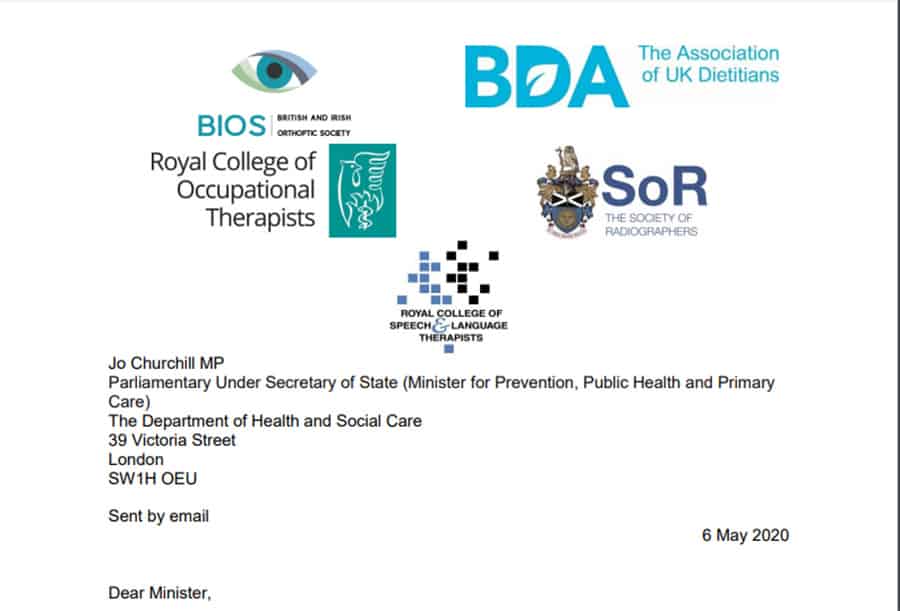Open letter calls on UK Government to extend prescribing rights to AHPs

A joint, open letter is calling on the UK Government to extend prescribing rights to various Allied Health Professionals (AHPs) to enhance patient care.
Addressed to Jo Churchill, the Minister for Prevention, the open letter is calling for the UK Government to extend AHPs’ legal ability to become non-medical prescribers as a means to enhance patient care.
The letter is jointly written by the Royal College of Occupational Therapists (RCOT), the Royal College of Speech and Language Therapists, the British and Irish Orthoptic Society and the Society of Radiographers.
Allied health professionals (AHPs) provide system-wide care to assess, treat, diagnose and discharge patients across social care, housing, education, and independent and voluntary sectors. Allied health professions refer to 14 different roles within the NHS including occupational therapists (OTs), physiotherapists (PTs), prosthetists, orthotists, and speech and language therapists (SLTs).
The current Medicines and Medical Devices Bill has the power to extend prescribing responsibilities to new professional groups where it is safe and appropriate to do so.
Noting the benefits of extending prescribing rights to various AHPs, the letter says that extending prescribing responsibilities can enhance patient care, free up clinicians’ time and provide potential cost savings to the NHS.
The letter outlines the following key benefits of extending prescribing rights:
- better support and more timely care for the patients AHPs work with, including enabling them to have more timely and equitable access to treatment
- improved patient safety through AHPs making safe medication decisions, which is particularly important during the coronavirus crisis where clinicians are being redeployed to less familiar settings and potentially signing off on medication in an area where they have less experience than the AHP
- reduced pressure on overstretched professionals, including GPs, and freeing up their time. If AHPs were given the required prescribing rights, it would enable them, in many situations, to manage the patient’s care pathway, therefore freeing up other clinicians’ time
- improved system efficiency, both from the perspective of the patient and other health professionals. Prescribing rights would enable AHPs to manage medications as part of seeing a patient, without the need for a referral and appointment with another clinician, resulting in a significant reduction in unnecessary delays and costs
In addition to explaining the various benefits of extending prescribing rights to various AHPs, the letter also underlines the current prescribing rights for OTs, dieticians, orthoptists, radiographers, and speech and language therapists, and what rights the various professions seek.
The letter adds: “Planning for the future, we believe that extending prescribing rights will also make a significant positive difference to our members’, and the wider system’s, ability to respond as swiftly and efficiently as possible to the predicted post-COVID-19 surge in demand on health services.
“This includes those with non-COVID-19 conditions who may be on waiting lists for assessment or awaiting the continuation of treatment which may have been missed for weeks or months.”
You can read the open letter in full here
Karin Orman, RCOT Assistant Director – Professional Practice, said: “With occupational therapists at the forefront of the UK’s response to COVID-19, we want to arm them with all the tools they need to help the millions of people and their families across the UK who have been directly affected. This includes expanding the profession’s legal prescribing responsibilities.
“Our members could enhance patient care even further. By extending prescribing responsibilities for occupational therapists, they can deliver better and timelier patient care which will reduce pressure on the wider health and social care system. We hope the government grasps this opportunity to help maximise the impact of occupational therapists.”

